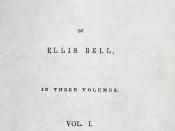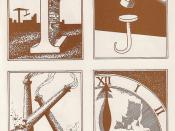The only novel written by Emily Brontë before her untimely death, Wuthering Heights occupies a distinctive position between Gothic and Romantic fiction, and it reflects the central thematic interests of both of these genres. Its melodramatic story spans more than three decades, but it is the supranatural passion between Catherine (Cathy) Earnshaw and Heathcliff that dominates the entire book, exerting a controlling influence over the lives of Brontë's characters long after Cathy's physical demise. Brontë appears to deliberately cloud the central question of whether her story is to be read as a supernatural horror story or an emotionally charged romance. The lightning rod of this issue is Heathcliff, an individual who necessarily evokes powerful but somewhat contradictory responses from the other characters in the novel and from the reader as well. Is Heathcliff a devil or just an extraordinarily driven man? Our response to Heathcliff, to the love he shares with Cathy, and, therefore, to the novel as a whole, is further complicated by the Brontë's use of multiple narrators--Nelly Dean and Mr. Lockwood--each of whom plays a role in the tale, who hold radically different perspectives on the novel's lovers.
The relationship between Cathy and Heathcliff is the epicenter of Wuthering Heights, and their love is so intense that it is difficult to characterize, reaching well into the realm of metaphysics. Raised together in the Earnshaw household, Cathy and Heathcliff roam the moors and share identical opinions about the inhabitants of Wuthering Heights and Thrushcross Grange. The depth of Cathy's identification with Heathcliff is evident from her crucial confession to Nelly Dean in which she says, "He's more myself than I am. Whatever our souls are made of, his and mine are the same," and then adds the now-famous declaration, "I am Heathcliff" (p.92). When Cathy dies...


